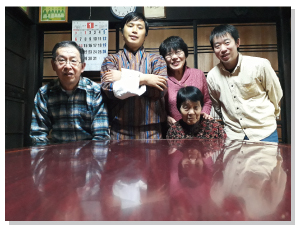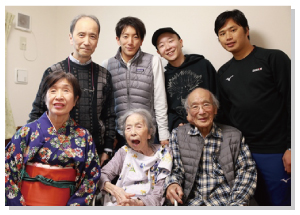Final Report
Yonten's Final Report
Never give up until I achieve my goals.
A. Japanese and Japanese Sign Language:
Before coming to Japan, I did not understand Japanese at all. However, from September to December 2018, I focused on Japanese from greetings to simple conversations. Our teachers’ excellent teaching method was truly impressive. In addition, in order to improve our Japanese, the organizer of our training program told us to submit a weekly report in Japanese. Thanks to this arrangement, I can now read, write and speak simple and basic Japanese.
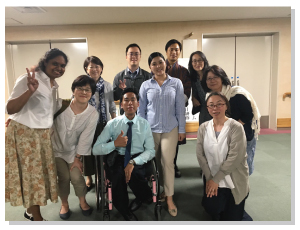
B. Individual Training Programs
Our training organizer arranged specific programs for me, based on my own interests. I received practical training at various organizations around Japan and understood the real situations and services for persons with disabilities in Japan. During the individual training program period (of four months), I visited public institutions, rehabilitation centers, special schools, libraries and support centers for students with disabilities, national and local organizations, as well as NGOs and NPOs for persons with disabilities throughout Japan. In the beginning, I wasn't very good at communicating in Japanese and gaining knowledge, so it was a big challenge. Gradually, I began to see progress. Here are some of the places I visited, from which I learned a lot about people with disabilities.
1. Services for People with Visual Impairment, Including Braille Production at Nippon Lighthouse
At Nippon Lighthouse, I learned about and gained experience on Japan’s welfare policy and its implementation. The training program at Nippon Lighthouse also included disability movement, volunteer programs and employment and recreational activities for people with disabilities. I visited rehabilitation centers, student support centers, a guide dog center, a Braille production center and libraries in Osaka. I also had the opportunity to meet experts of the issues above and had very healthy and fruitful academic discussions with them. I also visited several universities and learned about social welfare systems, Japanese laws, and laws for people with disabilities. This experience helped me understand the implementation and practice of each prefecture. There are 47 prefectures in Japan, each implementing their own social welfare policies in their own way.
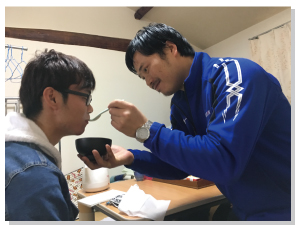
2. Japan Braille Library
The Japan Braille Library (hereafter “JBL”) is the nation's largest library for people with visual impairment or print disability. The library offers various services including Braille and talking books that users can borrow. At the JBL, I learned the history of how it was formed, its services towards persons with disabilities, book productions and international collaborations.
3. DAISY at ATDO
DAISY is a system for people who have difficulty in reading printed materials. When I was a student at the National Institute for the Visually Impaired, Bhutan, there were few books in Braille and no audio books, so it became my aspiration to create books that are accessible to everyone. Incidentally, I was given an opportunity at ATDO to learn how to produce DAISY books. After that, I met many volunteer workers at Nippon Lighthouse and the Japan Braille Library and watched them convert books to DAISY. I plan to practice my new DAISY skills in my country and will hopefully start producing DAISY books.
4. Employment for Persons with Disabilities at WITH
WITH is a place that offers work to people who have difficulty in finding employment in the open labor market because of intellectual, physical or other disabilities. The aim of WITH is to work together and challenge together. The fundamental philosophy of WITH is “Together with persons with disabilities”. At WITH, I learned about employment for persons with disabilities and how to make a white cane, how it is used, and different types of white canes.
5. Orientation and Mobility Training at UNI
At UNI, I learned about their services for persons with disabilities and their training programs for service assistants. At UNI, I learned about how to support people with severe disabilities, captioning services for persons with hearing impairment and orientations and mobility services for persons with visual impairment.
I gained an important concept from my individual training programs at various organizations. It is to make people with disabilities strong enough so that they can make their own choices and decisions. Also, the experience encouraged to work harder to experience and learn about living independently.
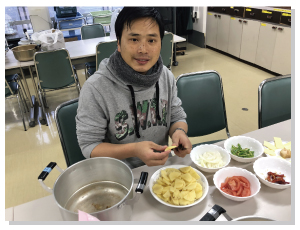
My future Goal is to set up a new organization:
The training program improved my communication skills through experiences and exchange of ideas, and my leadership skill has improved. The program has also greatly helped my understanding of disability-related issues and services in Japan. Perhaps it will help me achieve my mission and goal, which is to “set up a new organization in my community, organize activities, and provide services similar to those in Japan.”
Title: Blind Association of Bhutan (BAB)
Mission: Support the visually impaired by providing opportunities and chances to participate in society.
Objectives:
- Raising public Awareness concerning the rights of the visually impaired.
- Orientation and mobility training
- Basic Braille skills
- Provide accessible books (Braille books, DAISY, picture textile books, and more)
- Sports (paralympic games)
There are 40 NGOs in Bhutan, but only three are working for persons with disabilities. So, the services for persons with disabilities are very limited and so far, we have no organization for persons with visual impairment. That is why I intend to set up a new organization for the blind so that I can utilize what I have learned and experienced in Japan. In addition, I am familiar with the challenges of blind people in Bhutan. I think it will be very difficult to establish a new organization. To achieve the goals I listed up above, I will need to rely on public donations and assistance. But I will work hard and will not give up until I achieve my goals.
Fun moments in Japan
In addition to studying and learning, I had a lot of fun times in Japan, such as homestay, skiing, swimming and sightseeing. Through these programs, I learned about Japanese culture and lifestyle, and improved my abilities and skills through new experiences. All this knowledge will help me bring positive contribution to Bhutan’s society.
Finally, my leadership training has successfully come to an end. My special acknowledgement goes to the Duskin AINOWA Foundation, JSRPD, the organizations I visited, my host family, Toyama Sunrise and everyone that I met in the last 10 months for your love and care. Thank you so much.
If you are planning to come to Bhutan, or if you want to visit Bhutan, you are most welcome, and as a token of gratitude I will always be there for you.
